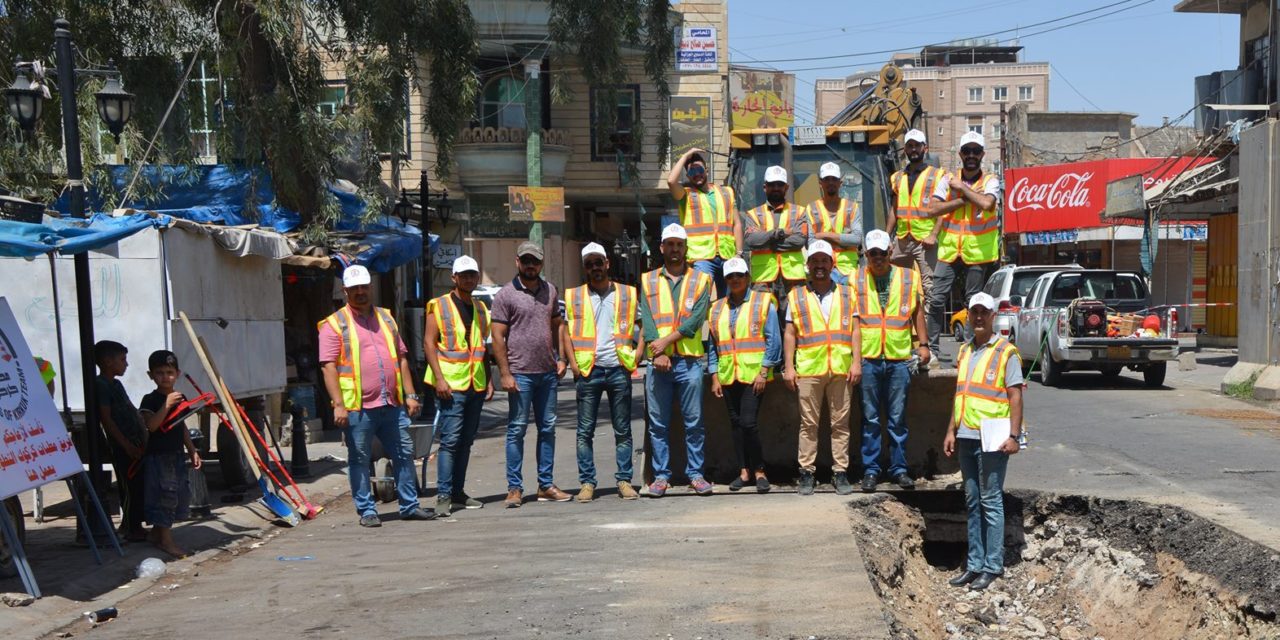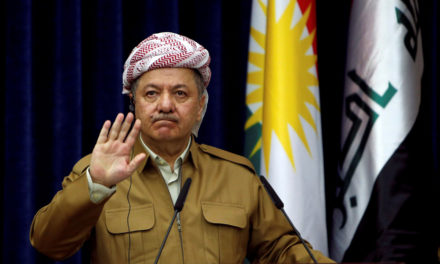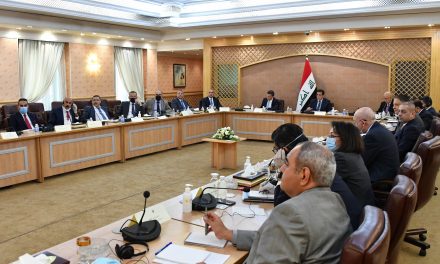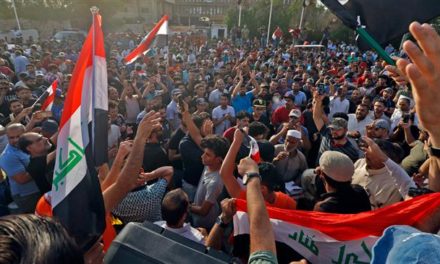(Photo: Pitfalls of Kirkuk Team Social Media)
Salus populi suprema lex esto
Let the good of the people be the supreme law
Iraq’s new entrepreneurial generation of civil activists’ sense of civic duty flourished during the trauma brought by the ISIS takeover of a third of the country in 2014, and has continued to grow since then as reviewed in a recent report. The report into “A New Generation of Activists Circumvents Iraq’s Political Paralysis” also looked into the origins and the determination of these civil activists to “develop solutions to policy problems that the political class has been unable to address”.
It is remarkable that, just as the governance failures of the ethno-sectarian warring political elites proved such a fertile ground for the rise of ISIS, their parallel failures in the provision of services have proved an equally fertile ground for the rise of civil activism. Moreover, almost all of the civil activist groups, that have risen over the last few years, emphasize the voluntary aspect of their activities and the desire to provide a service to their community and country. This is in stark contrast to the prevalent levels of indifference, corruption and self-serving found in most government departments and agencies, whether at the federal or local levels, which are charged with providing similar services that the civil activist groups have taken upon themselves to provide.
A typical example of the civil activist spirit is found in the “Pitfalls of Kirkuk Team”, started in the summer of last year, whose purpose is to beautify their city of Kirkuk by fixing the potholes that afflict its roads the same way that they do for most roads in Iraq.
Potholes are the bane of every city worldwide, and a growing problem that all cities are struggling to address. Like rats they plague roads everywhere, in both hot or cold climates, and are the cause of all forms of damage, to life and property, in the developing and the developed world. However, in Iraq they gain an extra dimension in that the roads, like much of the country’s infrastructure, suffered a great deal over the last four decades of conflict from destruction, deterioration and chronic low levels of maintenance and upkeep. The last time the country saw city planning on any scale was in the early 1980’s when the population was less than 15 million.
Iraq’s opening to world markets after 2003 was followed by a major expansion in vehicle imports with the total vehicles in use almost doubling from 2005 until 2015 (below chart).
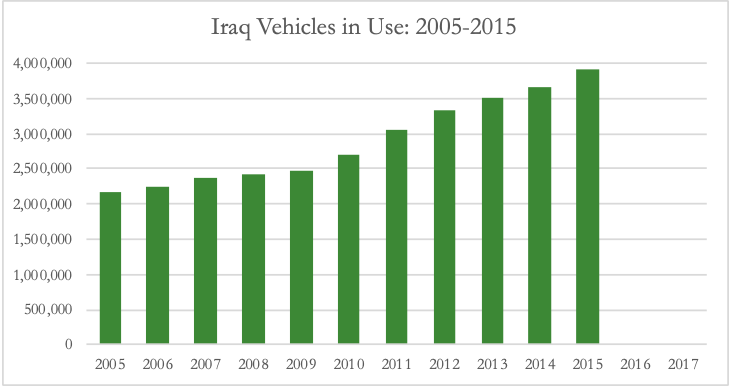
Source: International Organization of Motor Vehicle Manufacturers
New vehicle sales contracted sharply as a result of the double whammy of the ISIS conflict and the collapse in oil prices, however the recovery that began in 2017 (chart below) has likely continued in 2018 and 2019 in-line with the early economic pickup brought about by the recovery in oil prices and the end of the ISIS conflict.
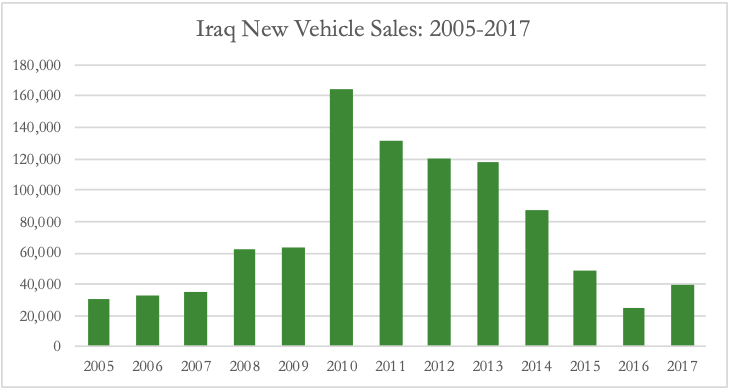
Source: International Organization of Motor Vehicle Manufacturers
The swelling in vehicle usage over the last 15 years and the growth in the population to over 38 million took place without any growth in the capacity of the roads and with almost no investment in the cities’ infrastructures placed unbearable strains on the country’s roads. All of which made the daily commute a nightmare, that the addition of blocked roads and checkpoints turned into a journey through hell. The resultant drudgery of life, in addition to a litany of public grievances, over the years has contributed to the sense of anger and discontent at the lack of investments into the cities’ infrastructures.
Compounding these are the accumulation of potholes over the years, and the damage inflicted on life and property, which together with the inability of the municipalities to keep up with the swelling backlog of potholes, has further fed the public’s discontent with the government. About the only beneficiaries of the pothole’s plague have been the country’s car repair shops and the used car parts dealers. The importance of the level of discontent on the state’s legitimacy in the eyes of citizens was not lost on ISIS, which in its early days in Mosul sought to gain such legitimacy by focusing on repairing and maintaining Mosul’s roads as revealed in this 2015 article.
This is where the entrepreneurs of “Pitfalls of Kirkuk Team” enter the picture. While they are not the first group to volunteer fixing the cities’ potholes, they seem to be the first that has approached this professionally by liaising with the local municipalities and the police, while maintaining the same spirit of voluntary work and public service as the country’s other civil movements.
Their workings as explained by the group’s leader go through a connected and well thought out process. The group starts by collecting information and complaints from the city’s citizens on their Facebook page, they then conduct studies of the sites to fix, raise a report to advisers and experts, followed by both a financial report and a work plan that is shared with the municipality, then liaise with it on fixing the potholes and the and police on road closures and traffic diversion while the work is carried out. These are followed by seeking local views on the work performed and raising the final reports, financial and operational, to the local authorities. The group’s only source of funds come from the group’s network and from citizen donations. The equipment and materials used are provided by the local municipalities and authorities, including the state’s North Oil Company, while the concrete used is provided as a donation by a local company (Sherwan Group). The group’s work in action can be seen in this video.
The group’s approach of active and constructive engagement with the local municipalities and authorities goes a long way towards bridging the trust gap between the citizens and these authorities. Moreover, the involvement of the local authorities in the planning and the executions ensures that the work complies with the accepted standards for roadworks and would provide opportunities in the future for more collaboration in other areas such as city cleaning and road maintenance.
The success of such an entrepreneurial approach in addressing some of Kirkuk’s pressing problems, would encourage the development of similar projects in Iraq’s other cities. Collectively, in ending the potholes’ plague, such projects would go a long way towards easing the grind and misery of the daily commute and improve the lives of Iraqis in very tangible ways. All of these would lower the tempo of discontent and help cultivate a much-needed sense of civic ownership and national dialogue.
Disclaimer
Ahmed Tabaqchali’s comments, opinions and analyses are personal views and are intended to be for informational purposes and general interest only and should not be construed as individual investment advice or a recommendation or solicitation to buy, sell or hold any fund or security or to adopt any investment strategy. It does not constitute legal or tax or investment advice. The information provided in this material is compiled from sources that are believed to be reliable, but no guarantee is made of its correctness, is rendered as at publication date and may change without notice and it is not intended as a complete analysis of every material fact regarding Iraq, the region, market or investment.

Ahmed Tabaqchali
Ahmed Tabaqchali, the Chief Investment Officer (CIO) of Asia Frontier Capital’s AFC Iraq Fund, is an experienced Capital Markets professional with over 25 years experiences in US and MENA markets. Currently a Fellow at the Institute of Regional and International Studies (IRIS) at the American University of Iraq-Sulaimani (AUIS).

